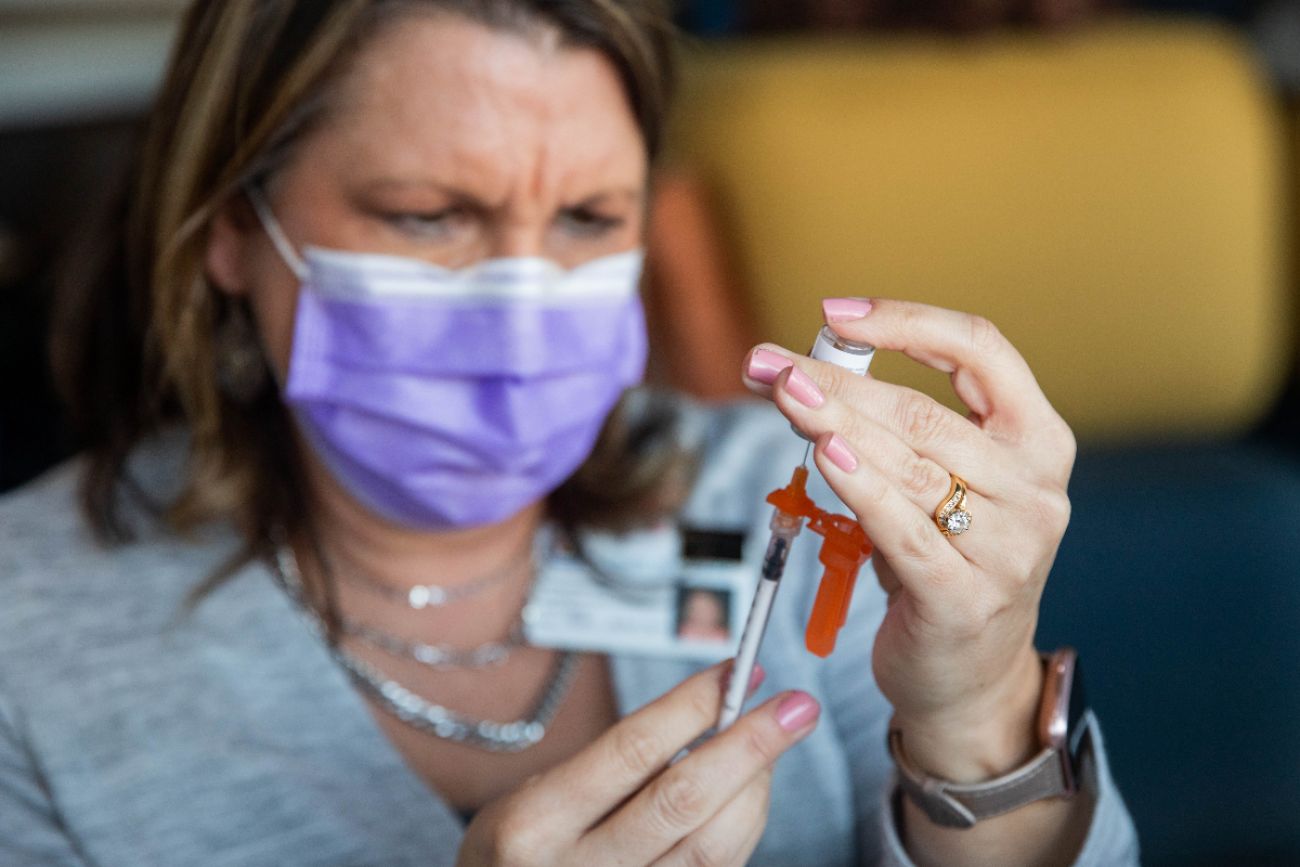COVID boosters likely coming to Michigan in September. What to know.

Oct. 18: COVID vaccine boosters: When, where and how to get them in Michigan
Sept. 24: Pfizer COVID vaccine booster approved for Michiganders. Now what?
Sept. 20: Pfizer: COVID vaccine gives ‘robust’ protection for children ages 5 to 11
Sept. 17: FDA panel backs Pfizer COVID booster for people 65+ and with weak immunity
COVID booster shots will be widely available starting Sept. 20, the White House announced Wednesday, as the delta variant continues to tighten its hold across the nation and in Michigan.
At least for now, boosters are recommended for anyone who received the two-dose Pfizer and Moderna shots, and will be available eight months after they received their second dose. Those who received their second vaccine Feb. 1, for example, could receive a booster as soon as Oct. 1.
Those who are moderately to severely immunocompromised, are more immediately eligible, under the federal plan.
Related stories:
- Biden vaccine mandate: What’s it mean for Michigan schools, those who refuse?
- A Michigan doctor goes to Facebook over dying, unvaccinated COVID patients
- Republicans advance bills to bar Michigan school mask mandates
- ER’s nearly full, Beaumont asks patients to go elsewhere if possible
- Michigan COVID nurses reach their limit: ‘I know I can’t do this forever’
- COVID surge has largely missed Michigan. Has the state dodged a bullet?
- 2 million Michigan workers may be impacted by Biden’s vaccine mandate
- Michigan GOP eyes limits to vaccine, mask rules. Health officials dismayed
Experts say boosters likely also will be recommended eventually for those who received the one-dose Johnson & Johnson dose, but it needs more study.
The booster plan must still be reviewed and approved by the U.S. Food and Drug Administration and the Centers for Disease Control and Prevention, U.S. Surgeon General Vivek Murthy noted Wednesday, in announcing the plan. The broad recommendations drew criticism from some health experts, who are skeptical boosters are necessary for all Americans who’ve been vaccinated.
So why is a booster needed, and who should get it and how?
Three Michigan health experts helped sort through questions.
Who needs to get a booster?
The recommendations for the time being are limited to those who received the Moderna and Pfizer shots, with one group singled out for more urgent priority — “moderately to severely immunocompromised people.”
Last week, the CDC’s Advisory Committee on Immunization Practices recommended a booster for immunocompromised people as soon as 28 days after they completed their first series of Moderna or Pfizer vaccines. While the booster’s “clinical benefit is not precisely known,” it’s believed that the booster will trigger a more robust response.
On Wednesday, the White House announced boosters would be recommended for anyone else eight months after completing their second dose of the Pfizer or Moderna vaccines.
Who gets the booster first?
For now, there is no detailed distribution plan for boosters in Michigan as there was when the first vaccines became available in December. When vaccines were first approved last year, they were limited, so people most vulnerable to the coronavirus were given priority. That included health care workers and residents and staff of nursing homes and other long-term care. They were later made available in increments to others in the general public, starting with seniors. The limited availability of vaccines meant thousands of shots were dispensed daily, with frequent complaints of long waiting lists and line-cutters.
Much has changed since then.
There is now ample supply of vaccine — so much that the state has been forced to discard expiring doses or send them out of state when possible. And pharmacies, family doctors and specialists have supplies, too, said Linda Vail, health officer in Ingham County.
Vail said the eight-month waiting period before people can get a booster will more naturally spread out demand: “Everyone is going to land on their mark at a different time.”
Meanwhile, those who are immunocompromised may call local providers about scheduling an appointment. That includes, for example, solid organ transplant recipients, those being treated for cancer or with an active or untreated HIV infection.
The Macomb County health department, for example, will make those doses available starting Monday. Residents can book appointments online.
Because of the staggered rollout of the initial doses, priority for booster shots will likely follow a similar pattern — with health care workers and seniors being the first eligible, said Phillip Bergquist, chief operating officer at Michigan Primary Care Association, which represents medical clinics throughout the state that serve, among others, the poor and uninsured.
“It’s not as formal, but we will find ourselves falling into the same cycle,” as the earlier distribution patterns, he said.
But I thought the initial vaccines were supposed to protect me?
For the vast majority of vaccinated people, they do, but medical experts never promised a lifetime of protection. Some early, not-yet-peer-reviewed studies show the Pfizer vaccine in particular is proving less effective against the delta variant, with Pfizer itself acknowledging a slow decline in efficacy.
“We know that even highly effective vaccines become less effective over time,” Murthy said Wednesday, in announcing the boosters. “Our goal has been to determine when that time might come to the COVID-19 vaccines.”
Studying blood samples and the human immune system, researchers say a person’s antibodies against COVID — one of the immune system's layers of protection from a vaccine or from a prior infection — can wane over time.
In much the same way, immunity wears off against other illnesses such as tetanus — a rare but potentially fatal disease — which is why a tetanus booster is recommended every 10 years. Boosters also are recommended for children and young adults against diseases like measles, pertussis, Hepatitis A and B and pneumonia.
“It’s not as though (your immunity) is gone but we're looking at providing a more robust immune response” with boosters, said Vail, the Ingham County health officer and former Pfizer biomedical researcher.
Some previously have predicted that a COVID vaccine ultimately might follow the same route as the yearly flu vaccine. But that’s a bit different. Each year’s flu shot is a brand new, reformulated vaccine — rather than a booster shot. The reformulated flu shot is designed to protect against strains of influenza most likely to circulate during flu season.
It’s not clear whether an annual COVID vaccine calibrated to the latest variants will be required, similar to an annual flu shot.
For now, the COVID booster shot is a repeat — the same formula — of the shot you likely received earlier this year, meant to trigger your earlier defense.
Are there enough boosters?
There’s no need to scramble, health officers told Bridge.
Demand for initial vaccines slowed over the summer — so much so that the state of Michigan has had to dispose of some expiring doses or send them to other states. As of Wednesday, just 61 percent of eligible Michiganders had been vaccinated.
Public health departments continue to try to reach the vaccine-reluctant or those who haven’t been able to get a vaccine. But long ago, distribution moved from handling thousands of cars a day through drive-through clinics to one-on-one efforts by health officials to get people vaccinated at places like festivals and fairs.
“We’re not really concerned about quantities at this time,” said Andrew Cox, health officer for Macomb County. “We can order (more vaccines) on a regular basis.”
Even as the White House was making its announcement Wednesday, Michigan state officials held their own briefing to talk, in part, about the strength of the Delta variant, increasing caseloads, and the availability of booster shots.
The state is ready to deliver boosters immediately, taking cues from the Food and Drug Administration and the CDC, Dr. Joneigh Khaldun, chief medical executive for the Michigan Department of Health and Human Services, said.
“We are prepared and currently have ample supply of vaccines to be able to supply a third dose" to the immune-compromised and the general public, she said.
How much will the booster cost?
Like the original COVID vaccines, boosters will be free to consumers and will be delivered to long-term care facilities, according to the White House.
Under current rules, vaccine providers must waive administrative costs, too, said Dominic Pallone, executive director of the Michigan Association of Health Plans, which represents most of the state’s large insurers.
How will I know when it’s my turn?
The easiest way is to count eight months from your second vaccination date. It should be listed on your vaccine card.
If you don’t have a card or can’t remember the date, contact the provider of your vaccine.
Your electronic medical record also may have that information, but much depends on whether it was recorded there. In the rush of early mass vaccination clinics, vaccine information may not have been recorded in each person’s electronic medical record, even if it was recorded on paper or with the state’s immunization record, said Bergquist, at the Michigan Primary Care Association.
Residents can also request their immunization records from the state with this form.
And don’t be surprised if you get a call.
Doctors’ offices or clinics that have electronic medical records with your vaccine information may make follow-up calls when eight months nears, but that will be up to each provider, Bergquist said.
Clinics that are part of the MPCA likely will do phone or text reminders when possible, but those plans are still being worked out, he said.
See what new members are saying about why they donated to Bridge Michigan:
- “In order for this information to be accurate and unbiased it must be underwritten by its readers, not by special interests.” - Larry S.
- “Not many other media sources report on the topics Bridge does.” - Susan B.
- “Your journalism is outstanding and rare these days.” - Mark S.
If you want to ensure the future of nonpartisan, nonprofit Michigan journalism, please become a member today. You, too, will be asked why you donated and maybe we'll feature your quote next time!







